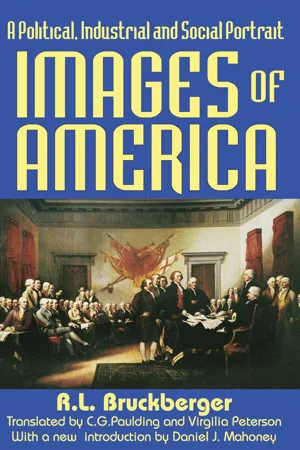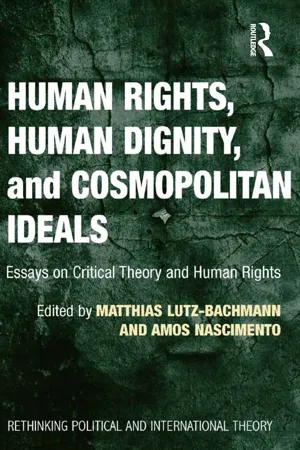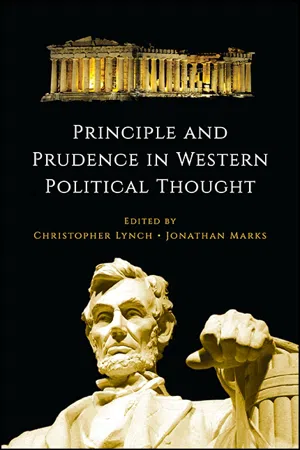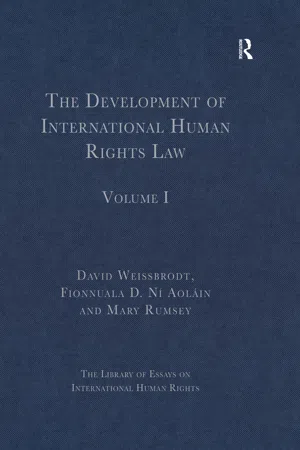Politics & International Relations
Philosophy of the Declaration of Independence
The philosophy of the Declaration of Independence is rooted in the idea of natural rights, asserting that all individuals are entitled to life, liberty, and the pursuit of happiness. It also emphasizes the right of the people to alter or abolish a government that fails to protect these rights. This philosophy reflects the Enlightenment ideals of individual autonomy and self-governance.
Written by Perlego with AI-assistance
Related key terms
Related key terms
1 of 4
Related key terms
1 of 3
4 Key excerpts on "Philosophy of the Declaration of Independence"
- eBook - ePub
Images of America
A Political, Industrial and Social Portrait
- R.L. Bruckberger(Author)
- 2017(Publication Date)
- Routledge(Publisher)
It seems to me to have epitomized, in advance, the Declaration of Independence, which reaffirms that there is no political legitimacy except in the consent of the governed and also that God is Creator, Providence, and Judge of mankind and of the world. The American Declaration follows the true course of a tradition, and it is the most ancient, the most venerable tradition in the political thinking of the West, since it is linked to Judeo-Christian Revelation with its concept of God, and to Rome and to Greek philosophy, with their concepts of the city state and of man. The quest for a philosophy that can explain the Declaration of Independence leads far beyond the mediocre philosophy of the eighteenth century, even beyond Locke. The American Declaration, made under specially favorable circumstances, was a moment in a politica perennis of the West. It is in the philosophia perennis of the West that its philosophical justification must be sought. The Declaration of Independence is not a Utopian document. Entirely unlike the Cartesian or Jacobin Revolutions, it made no tabula rasa. It is therefore in the traditional philosophy of the West, deriving from Greek philosophy, Roman law, and Judeo-Christian Revelation, and not in a philosophy of tabula rasa, that the meaning and the wording of the Declaration is best illuminated. This is the philosophy that best explains God to us, as Creator of nature, Providence, and Judge. This is the philosophy that best defines nature as it exists, particularly human nature, its rights, its duties, and its destiny. This is also the philosophy that best explains the sacredness of life and honor (“our Lives,” “our sacred Honor,”) that best teaches us the use of the things of this world (“our Fortunes”). As man’s ultimate goal this philosophy names beatitude (“the pursuit of Happiness”) - Matthias Lutz-Bachmann, Amos Nascimento(Authors)
- 2016(Publication Date)
- Routledge(Publisher)
1 that needs to reflect upon its own foundations. My reflections on the relationship between ethics and politics and the role of human rights aim at contributing to a discussion on this state of affairs.I would like to present my ideas on this topic according to three steps: First , I want to provide a brief survey of current debates confirming that the way in which the relationship between ethics and politics has been conceived in dominant contributions to a political philosophy of international relations is inadequate for various reasons and requires a different approach. Second , I want to propose a new perspective to justify the relationship between ethics and politics in light of new realities in world politics. Third , I would like to specify in more detail the implications this approach has for the question concerning the status of human rights.Critique of Contemporary Political Philosophies of International Relations
The political theory of international relations developed in recent years continues to walk in the footsteps of the modern political philosophy inaugurated by Hobbes, Kant, and Hegel. One example of this trend is the very influential theory of realism which has been adopted by national political consultants and is now presented as a supposedly precise analysis of the international realm of action. This theory continues to follow those far-reaching philosophical premises that Thomas Hobbes once presented as the presuppositions to the relationship among individuals in the “state of nature.” However, because the realist theory does not postulate a new sovereign or Leviathan as Hobbes did, it remains limited by a mere directory of accounts characterized as “realist.” If this theory had followed Hobbes consistently, it would have had to conceive of the sovereign as a World State [Weltstaat ] that claims all the power to itself while demanding and dominating the States of the World [Staatenwelt ]. This evaluation consists of the view that the only possibility beyond the juridical order guiding the relationship within the state would be anarchy among competing states which, in principle, cannot be overcome. In the realm of international politics, realism recognizes only the action of individual states that defend their national interests, above all those for their own survival. This prompts them to follow a politics of national security and sovereignty.2- Christopher Lynch, Jonathan Marks(Authors)
- 2016(Publication Date)
- SUNY Press(Publisher)
29The relation between these principles can be clarified by considering some more examples from the early history of the republic. This will also make clear that what is often inadequately dichotomized into idealism and realism is more accurately understood as a tension on the level of principle itself or as divergences in the prudent application of complementary principles.Historians treating the American debates over policy toward the problems posed by the French Revolution often characterize as “idealistic” the Jeffersonian sympathy with the Revolution and fidelity to the French Alliance, and call Hamiltonian neutrality “realistic.” As always, there is something to those characterizations, but it was also a debate on the level of principles as well as a divergence in prudential judgment of the situation. In the Declaration of Independence, the United States had appealed to the world (and above all to France) for aid in support of our revolution on behalf of the rights of men. Now the tables were turned, as they have been so often since. How do the principles we invoked on our own behalf apply to us when others invoke them? Jefferson, of course, could appeal on behalf of the French Revolution to the rights of all men and the right of revolution proclaimed in his Declaration. But Hamilton too could stand on the principled ground of the Declaration. He wrote in the Pacificus papers defending the Neutrality Proclamation: “under every form of government rulers are only trustees for the happiness and interest of their nation, and cannot, consistently with their trust, follow the suggestions of kindness or humanity toward others, to the prejudice of their constituents.”30 This is far from being simply realistic indifference to principle. For Hamilton, that people secure their rights through instituting governments that derive their just powers from the consent of the governed seems to mean that governments owe primary responsibility to securing the rights of those whose consent they enjoy. They have not been given the right to secure the rights of those whose consent they do not enjoy. In a more extreme form, John Randolph complained that John Quincy Adam’s Panama Mission message was “a doctrine that goes to take the whole human family under his special protection,” and asked: “Who gave him, the President of the United States, the custody of the liberties, or the rights, or the interests of South America, or any other America, save only the United States of America, or any other country under the sun?”31 John Quincy Adams himself said that although America “is the well-wisher to the freedom and independence of all,” she is “the champion and vindicator only of her own.”32- eBook - ePub
- Fionnuala D. Ní Aoláin, David Weissbrodt(Authors)
- 2017(Publication Date)
- Routledge(Publisher)
The idea of rights here distilled from contemporary international instruments responds, I believe, to common moral intuitions and accepted political principles. Those intuitions and principles have not been authoritatively articulated. Developed during the decades following the Second World War, international human rights are not the work of philosophers, but of politicians and citizens, and philosophers have only begun to try to build conceptual justifications for them. The international expressions of rights themselves claim no philosophical foundation, nor do they reflect any clear philosophical assumptions; they articulate no particular moral principles or any single, comprehensive theory of the relation of the individual to society. That there are “fundamental human rights” was a declared article of faith, “reaffirmed” by “the peoples of the United Nations” in the United Nations Charter. The Universal Declaration of Human Rights, striving for a pronouncement that would appeal to diverse political systems governing diverse peoples, built on that faith and shunned philosophical exploration. Because of that faith—and of political and ideological forces—governments accepted the concept of human rights, agreed that they were properly matters for international concern, cooperated to define them, assumed international obligations to respect them, and submitted to some international scrutiny as to their compliance with these obligations.International human rights derive from natural rights theories and systems, harking back through English, American, and French constitutionalism to John Locke et al., and earlier natural rights and natural law theory. In its American version, that constitutionalism included concepts of original individual autonomy translated into popular sovereignty; of a social compact providing for continued self-government through accountable representatives; of limited government for limited purposes; and retained, inalienable, individual rights (see essay 7). But the profound influence of that constitutionalism on international acceptance of human rights did not depend on, or take with it, commitment to all the underlying theory. International human rights reflect no comprehensive political theory of the relation of individual to society, only what is implied in the idea of individual rights against society. Human rights are “inherent” but not necessarily “retained” from any hypothetical state of nature anteceding government. There is a nod to popular sovereignty, but nothing of social compact or of continuing consent of the governed. Retained rights are not the condition of government, and violating them does not necessarily give rise to a right to undo government by revolution. Inevitably, international human rights also implicate the purposes for which governments are created, but they surely do not imply a commitment to government for limited purposes only. Born after various forms of socialism were established and spreading, and commitment to welfare economics and the welfare state was nearly universal, international human rights implied rather a conception of government as designed for all purposes and seasons. The rights deemed to be fundamental included not only limitations precluding government from invading civil and political rights, but positive obligations for government to promote economic and social well-being, implying government that is activist, intervening, planning, committed to economic-social programs for the society that would translate into economic-social rights for the individual (see essay 1).
Index pages curate the most relevant extracts from our library of academic textbooks. They’ve been created using an in-house natural language model (NLM), each adding context and meaning to key research topics.
Explore more topic indexes
Explore more topic indexes
1 of 6
Explore more topic indexes
1 of 4



